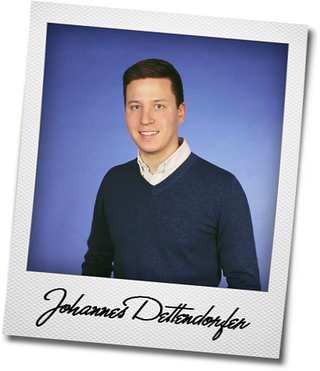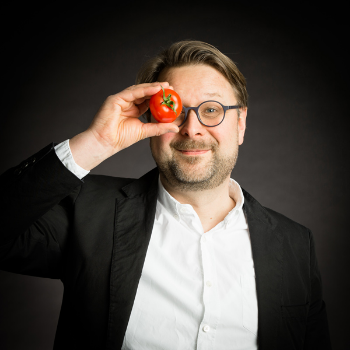

PMM: 245 tractor units, 443 trailers, 636 employees: How do you manage to maintain such personal contacts as with Paul M. Müller despite your size?
J. Dettendorfer: Customer relationships are important to us, we focus on talking to our customers personally - also to recognize the market.
PMM: What characterizes the partnership between Paul M. Müller and you?
J. Dettendorfer: It is honest, transparent and reliable. When we are notified of loads, they are 100 percent ready for loading and we can take them on. Paul M. Müller has also become a stable administrative partner for us.
PMM: What values are important to you when working together?
J. Dettendorfer: In principle, it is very important to us that customers work with us in a solution-oriented manner and that we create solutions together. The fact that trucks are sometimes late because they are stuck in a traffic jam or that a truck cannot be unloaded - for whatever reason - is always an issue. It is then important to look for and find solutions. That is the hallmark of a good partnership.
PMM: How do you manage to remain as flexible as you currently are?
J. Dettendorfer: We create very agile workflows in-house and maintain short communication channels. This allows us to remain adaptable.
PMM: What are your biggest challenges?
J. Dettendorfer: On the one hand, it's the lack of personnel, as in almost every area. On the other hand, political hurdles such as CO2 taxes or cost increases due to toll adjustments that are put in our way create an insane amount of work and an explosion in costs. We have to pass on to our customers what the state imposes on us.
PMM: How are you future-proofing your company?
J. Dettendorfer: On the one hand, we are focusing on a forwarding and a logistics division, which together form a strong
are. On the other hand, we rely on our own fleet, our own vehicles and our own assets with which we can supply our customers. With reliable partners like Paul M. Müller and a logistics world that is very large and continues to grow, I am positive. Just one example: e-commerce with Amazon. This will continue to find its way into many areas; we are only at the beginning here.
PMM: You have several locations - why is that important for your company?
J. Dettendorfer: Our group has 13 branches, and we are in the process of establishing the 14th branch. The reason for this is that we want and need to be close to our customers. This is essential in areas where we support plant logistics for shippers.
PMM: What happens if the burner fails?
J. Dettendorfer: Then the full extent of the bottleneck becomes clear. We have to focus on routes that do not rely on the Brenner route and the Europe Bridge. We are focusing on intermodal transport and on the shift from road to rail. We have launched several projects here and are already using rail over the Brenner Pass. At the moment, however, I cannot foresee how traffic will shift, how the volume flows will develop and what the scenarios will actually look like.
PMM: So rail is an issue for you?
J. Dettendorfer: Rail is a major building block for us that we rely on. We were already operating diverted, combined transport in the 1990s and we have been focusing on this hobbyhorse for years and trying to get our customers excited about it. You can't cover the entire volume on the road, you have to keep a second route open.
PMM: What do you think about e-mobility?
J. Dettendorfer: E-mobility is very difficult to consider, especially in our segment. We are not the parcel carrier around the corner or the general cargo forwarder who can electrify vehicles relatively easily. We need vehicles in the heavy-duty class, in the articulated truck class. Unfortunately, there are only very, very few manufacturers who can offer us this. The charging infrastructure is not yet in place for us to become active in this area. We see the future of e-mobility in the terminal sector or in the pre- and post-carriage areas, where we are also located and cover less than 300 to 400 kilometers per day.
PMM: Do you feel that sustainability is being demanded more and more in the industry?
J. Dettendorfer: Definitely. Sustainability is a huge aspect; we are very interested in planning our transportation and routes sustainably. We use bio-diesel in our own fleet and have also entered the e-fuel segment, and the topic of HVO (hydrogenated vegetable oils) is also on our agenda.
PMM: What is your quota for women and to what extent can a quota for women be implemented in a male-dominated industry?
J. Dettendorfer: We have a lot of women on board, the quota is high and we are very proud of that. This also promotes cooperation. Unfortunately, our proportion of women in the driver segment is very low. The circumstances that come with the job in international long-distance transport, e.g. the parking situation, service stations are overcrowded at night, drivers have to take their breaks in deserted industrial areas, also put off many female applicants.
PMM: You yourself were born in 1995. As the younger generation, do you bring new impetus to the company?
J. Dettendorfer: I am very happy that I was able to join our family business. We have meetings almost every day where we discuss what our strategy is and how we can best implement it.
PMM: What visions do you have for your company?
J. Dettendorfer: We want to grow - especially in the intermodal segment. We see this as an area in which we can make sustainable progress into the future. In the long term, we will not be able to handle all of our transports by road as we have in the past. Just look at the traffic density through Munich. Or the Brenner Pass. The Inn Valley block clearance. These hurdles are increasing. We are trying to strengthen unaccompanied traffic. Autonomous driving is exciting and could be a focus in the future. We have already supported an autonomous project, we were able to test a truck on the Rosenheim - Kiefersfelden route. That worked really well. Digitalization is also a priority. However, nobody can predict where we will be in 15 years' time.
PMM: Nice anecdote in passing: you have a company band...
J. Dettendorfer: That's right. My grandfather founded the company band and it is still very active today. The company band plays once a month in the Hofbräuhaus, and there are 50 to 60 events a year in total - mostly at weekends. This helps our employees to balance out the stressful forwarding business.
Johannes Dettendorfer, born in 1995, works in the acquisition department of Johann Dettendorfer Spedition Ferntrans GmbH & Co. KG. He completed his training at DB Schenker as a forwarding agent and graduated from DAV Bremen with a degree in logistics, materials and supply chain management.
